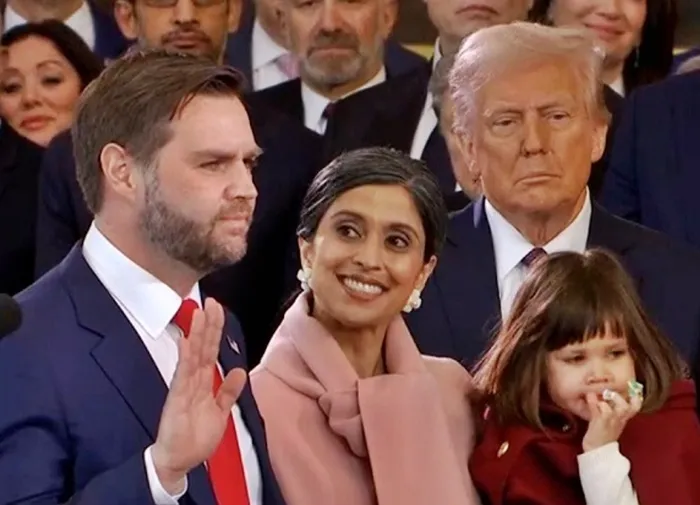Usha Chilukuri Vance: bridging cultures in American society and inspiring Indian-Americans

This historic milestone marks the first time a person of Indian origin has assumed this esteemed position, making her an emblem of pride and inspiration for the Indian diaspora worldwide. Usha Chilukuri Vance, the Second Lady of the United States, with her daughter Mirabel, watches her husband, JD Vance, being sworn into office as vice president. US President Donald Trump looks on. Picture: IANS
DR RAJENDRA GOVENDER
Usha Chilukuri Vance, the newly-appointed Second Lady of the United States and the wife of Vice President JD Vance, stands as a remarkable symbol of cultural integration, demonstrating how traditional Indian values can coexist with American ideals.
This historic milestone marks the first time a person of Indian origin has assumed this esteemed position, making her an emblem of pride and inspiration for the Indian diaspora worldwide.
Born to Telugu-speaking Indian immigrants in San Diego, California, Usha’s story resonates deeply with the Indian community, reflecting the journey of countless families who bring their heritage into a multicultural society, while embracing its diversity.
Her life, marriage, and contributions highlight values of social cohesion, cross-cultural understanding, and the significant influence of Indian Americans in the United States today.
Usha was raised in the upper-middle-class suburb of Rancho Peñasquitos, San Diego. Her parents, who migrated from Andhra Pradesh in the 1980s, are high achievers in their own right. Her father, a mechanical engineer educated at the prestigious Indian Institute of Technology (IIT) Madras, is a lecturer at San Diego State University, while her mother, a molecular biologist, serves as the provost at the University of California, San Diego.
They represent the aspirations and achievements of Indian immigrants who came to the United States not only to pursue professional success but also to maintain a connection to their heritage.
Growing up, Usha was instilled with pride in her Telugu heritage. Her parents made a conscious effort to nurture her cultural identity, teaching her the Telugu language, encouraging participation in traditional Hindu festivals, and grounding her in Hindu values. As a practicing Hindu, Usha continues to hold onto the spiritual beliefs that she learned from her parents, finding a way to blend her Indian roots with the American way of life.
Usha’s marriage to Vance exemplifies how two individuals from vastly different cultural backgrounds can come together and create a shared life that celebrates each partner's heritage. Cross-cultural marriages, especially between those from
Indian and Western backgrounds come with unique challenges but also offer the potential for rich, meaningful relationships rooted in mutual respect and understanding. Their union demonstrates how social cohesion can be fostered at a personal level, with each spouse honoring the other’s identity. This reflects the spirit of multicultural America—a place where families of diverse backgrounds coexist and contribute to a stronger society.
As the spouse of the vice president, Usha holds a unique position, representing both her Indian heritage and her role as a leader’s partner.
Her appointment signals a new era of diversity and inclusion in American leadership, highlighting the increasing representation of Indian Americans at the highest levels of government. This development is particularly significant for the Non-Resident Indian (NRI) community, who see her as a role model and a testament to the possibilities that exist for those who blend heritage with ambition.
In addition to her personal accomplishments, Usha’s role is poised to strengthen US-India relations. As someone who embodies both American and Indian cultures, she serves as a bridge between the two nations, fostering greater diplomatic ties, economic collaborations, and cultural exchanges. Her position also highlights the soft power of the Indian American community, which has long contributed to the US economy, culture, and innovation.
It is worth noting that President Donald Trump also recognised the contributions of Indian Americans through key appointments.
Nikki Haley served as the US Ambassador to the United Nations, and Seema Verma was the Administrator of the Centers for Medicare and Medicaid Services. These appointments paved the way for greater visibility and influence of Indian Americans in US governance.
Beyond the political sphere, Indian-origin leaders have made significant contributions to the US corporate sector, occupying some of the most influential roles in the world.
Sundar Pichai, the CEO of Alphabet (Google’s parent company), and Satya Nadella, the CEO of Microsoft, are two of the most prominent figures, both of whom have revolutionised the tech industry globally. Indra Nooyi, the former CEO and Chairperson of PepsiCo, broke barriers for women of colour in corporate America and continues to inspire future leaders.
Similarly, Arvind Krishna, the Chairman and CEO of IBM, and Shantanu Narayen, the CEO of Adobe, are driving innovation and setting new benchmarks in their respective fields. These individuals reflect the values of excellence and perseverance that define the Indian diaspora, and their achievements continue to bolster the image of Indian Americans as vital contributors to the nation’s progress.
Usha’s influence extends beyond her role as a supportive spouse. Her life exemplifies how Indian Americans can preserve cultural roots, while integrating into broader society. For Indians living abroad, especially in multicultural environments, her journey serves as a reminder that cultural pride and cross-cultural respect can coexist, creating thriving families and communities.
As more individuals of Indian origin continue to make their mark in the United States, Usha Chilukuri Vance’s story will undoubtedly inspire others to embrace both their heritage and their adopted homeland. Her life is a celebration of social cohesion, cross-cultural understanding, and the meaningful contributions that Indian Americans bring to the world.

Dr Govender is a social anthropologist, and social cohesion advocate. He is a Ford and IBSA research Fellow. As a researcher in specialises in cross cultural and diversity studies.
** The views expressed do not necessarily reflect the views of IOL or Independent Media.
Related Topics: